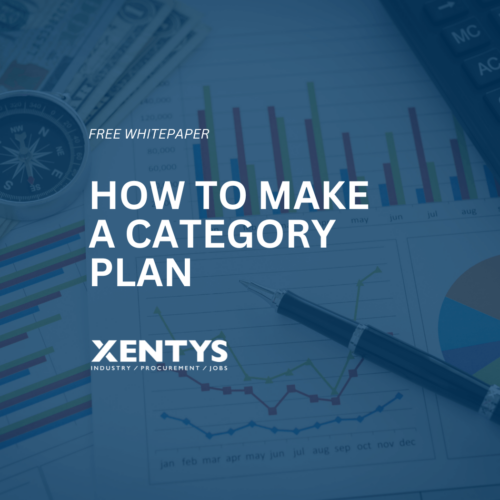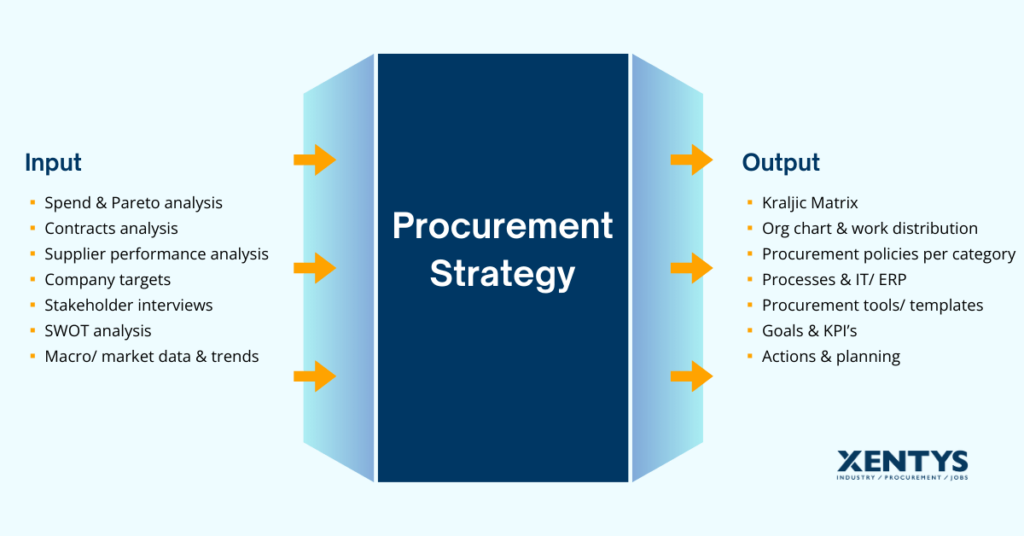Table of contents
Strategic purchasing is a term that is defined in many different ways. We define the term as: optimizing an organization’s procurement activities to create value and reduce risk in the medium to long term.
To accomplish this, the company’s “spending habits” must be analyzed. Consider activities such as seeking cost savings, process optimization and maintaining and strengthening long-term relationships with suppliers. Strategic sourcing is a critical part of supply chain management, and it can significantly impact profits.
Companies benefit from strategic sourcing through increased competitiveness, stronger supply chains and sustainable business growth. In general, activities around procurement to make data-driven decisions help achieve business goals.

FREE WHITE PAPER
Reduce Total Cost of Ownership (TCO) with the Kraljic Matrix
The importance of strategic purchasing for businesses
Strategic purchasing is essential for companies striving for success (i.e., virtually every organization). The entire procurement process involves identifying, sourcing, negotiating and managing suppliers to secure needed goods and services. This strategy can:
- Cutting costs;
- Improve quality;
- Increasing competitiveness;
- And contribute to excellent relationships with suppliers for a more stable supply chain;
Companies can benefit further by integrating procurement with other business functions such as finance, marketing and logistics. Ultimately, strategic sourcing and sufficient knowledge helps companies obtain the right products/goods, at an appropriate price.
The strategic procurement process
Strategic procurement is the process of identifying, researching, negotiating, monitoring and managing suppliers to acquire appropriate goods and services. Purchasers with proven experience play an important role in this. The process involves a comprehensive approach to procurement that goes beyond simply buying products or services at the lowest price. Procurement activities are looked at with a strategic perspective. We would like to explain important parts of this process below:
Procurement needs analysis
Procurement needs analysis is an important aspect for strategic buyers. By analyzing spending patterns, buyers can cut costs and identify process improvements.
An optimized strategy, based on insights gained from procurement needs analysis, helps companies achieve their goals and those of their customers. It also helps them become more efficient and profitable in the long run. This long-term vision is unlike tactical procurement and operational procurement. Investing in a thorough procurement needs analysis can give companies a competitive advantage.
Market research and supplier selection
The strategic procurement process requires thorough market research and proper supplier selection. Companies must do research to identify potential suppliers, compare prices and assess their performance. Supplier selection includes an assessment of suppliers based on quality, price, delivery time and customer service. Objective criteria are needed to evaluate potential suppliers.
Strategic purchasing can result in long-term cost savings, reduced risk and optimal profits by selecting the appropriate suppliers for the company’s needs. This process should certainly not be a one-off. This inextricable component must be continually reviewed and updated to ensure that the chosen suppliers continue to best meet the requirements of the business. Clear communication, negotiations and contracts can help companies build strong relationships with suppliers.

Free whitepaper
Project Procurement in the Machine Building Sector
Negotiations and contracts
Negotiation and contract management are essential to the entire organization. Companies can negotiate better terms from their suppliers, ultimately increasing their profits. Contract management helps ensure that both parties fulfill their obligations, reducing disruptions and building stronger relationships.
By accurately executing negotiations and contract management as a strategic buyer, you ensure that your company gets the best value from suppliers while reducing risk. To optimize procurement activities for long-term success, you will need to prioritize effective negotiation and contract management.
Performance measurement and improvement
This last part is perhaps the most important. Performance measurement and continuous improvement are the essential components of the strategic procurement process. Once a contract is in place, suppliers must be monitored and reviewed to ensure they meet your company’s requirements. By performance measurement, we mean the measurement of things like customer service, delivery times and quality.
By doing this, you as a company can recognize problems early and address them appropriately. Continuous improvement involves seeking improvements, such as alternative suppliers or opportunities for innovation. This can improve purchasing strategies and lead to long-term success. Today, the integration of procurement with other business activities makes it possible to optimize performance and improve collaboration
Challenges and opportunities for strategic buyers
As a strategic buyer, you will be dealing with a complex and constantly changing environment. It’s up to you to procure the right products and services at the best price and quality, while also considering the company’s interests. In this paragraph, we will discuss the challenges and opportunities that strategic buyers face, and how to deal with them effectively.
From technological developments to changing market trends, we will discuss key factors affecting the procurement process and how strategic buyers can leverage them to move their organizations forward.
Changing market conditions and trends
Do you want to maintain a competitive advantage as a company? Then you will have to continuously adapt yourself to the changing market. Strategic sourcing requires regular redesign of supply chains to take advantage of new opportunities and challenges.
Flexibility, innovation and strategic thinking are required for successful strategic purchasing. This is because sustainability, political uncertainty and cost-cutting are demanding attention. By following new trends and taking proactive steps, companies can strengthen their competitive position and secure their future.
Find a buyer through xentys
At xentys, your experienced procurement recruitment agency, we are happy to help you find the right professional for your procurement team. Send a message today and strengthen your purchasing department.
Technological developments
Advanced software and data analysis tools have a significant effect on procurement processes and new strategies. Automation enables organizations to make decisions faster, mitigate risks and predict prospects.
Dealing strategically with rapidly innovating procurement technology is essential to gain competitive advantage and move forward.
Social responsibility
Companies looking to optimize their procurement strategies must consider sustainability and social responsibility. Quality and price are no longer the only considerations. Sustainable materials, products and circular processes can reduce a company’s carbon footprint.
Today, companies are also expected to support local communities by seeking suppliers who share the same values of sustainability and social responsibility. Not only can this benefit businesses, but it also has positive implications for future generations.

FREE WHITE PAPER
How to Make a Category Plan
Competitive business strategies
A competitive business strategy allows companies to optimize supply chain management and reduce costs. In this case, the main focus is on improving competitiveness.
Understanding the various competitive business strategies in the market, such as differentiation, cost leadership or focus, is essential to creating an effective plan. Therefore, the primary process is to align strategy with business objectives and ensure fluidity between departments.
Recommendations for improving the procurement process
For a better procurement process, it is important to consider several recommendations. Do you have any questions about this? If so, please contact xentys. In summary, strategic purchasing boils down to the following recommendations:
- Learn to understand the specific market (or niche) and suppliers through market analysis and relationship building, among other things. Performing analysis also allows you as a strategic buyer to make informed recommendations.
- Use modern technologies and data such as data analytics and automation. This contributes to process optimization and increased efficiency.
- Prioritize sustainability and social responsibility for competitive advantage.
- Strive to continually evaluate and improve the process for cost effectiveness and success in a rapidly changing business world.
Follow these recommendations to help create an effective procurement strategy as a professional.







